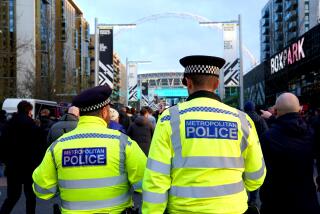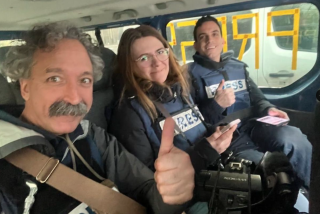Russia TV anchor slain, official hurt in North Caucasus attacks
- Share via
MOSCOW — A journalist with Russian state television was killed and a government official was injured in separate attacks in the country’s violence-ridden North Caucasus region, authorities said Thursday.
Kazbek Gekkiyev, a 28-year-old anchor for the Russia-1 state television channel, was gunned down late Wednesday in downtown Nalchik, capital of the Kabardino-Balkarian republic, officials said. The journalist was allegedly approached by two men who asked whether he was Gekkiyev. When he confirmed his identity, the assailants reportedly shot him several times and fled.
Russian officials said the slaying appeared to be related to Gekkiyev’s work. An Islamist insurgency in the region has resulted in violent clashes as well as threats against journalists criticized by militants for seemingly favoring law enforcement authorities.
“We can view this impudent crime as a threat to other journalists speaking about the results of the struggle against the bandits underground,” Vladimir Markin, a spokesman for Russia’s Investigative Committee, said in televised remarks.
Glasnost Protection Foundation, a Moscow-based human rights group, documented 132 deaths of journalists nationwide in the last 12 years, including four this year. Gekkiyev’s slaying was unusual because he was not an investigative or opposition journalist, as were most of those killed, said Boris Timoshenko, the foundation’s information chief.
“In most cases he read texts written for him by somebody else, and if he was really killed by the local Islamic militants, his death was intended as a signal for all journalists to know that they can be targeted too,” Timoshenko said in an interview. He called Russia “by far the most dangerous place for journalists to work in” compared with Europe.
Two Nalchik reporters who worked for Russia-1 quit this year after receiving threats.
President Vladimir Putin said in televised remarks he was confident that law enforcement officials would do their best to pursue and punish those responsible for the killing. He also said officials must improve “the efficiency of our work” to prevent such violence.
In many cases, the slayings of journalists in Russia have remained unresolved. The investigation remains open, for example, in the high-profile case of crusading journalist Anna Politkovskaya’s 2006 death. The prime suspects include two former police officers.
Islamist resistance spread to the republics of Ingushetia, Dagestan and Kabardino-Balkaria after separatist wars in Chechnya.
Alexander Cherkasov, a board member of the Memorial human rights group, said in an interview that Gekkiyev’s slaying may signal that resistance leaders are willing to become more violent.
“The new resistance leaders who are younger and have far fewer qualms as who to attack and kill for the sake of their cause must have decided to abide by fewer limits of violence as well, including violence that can now be aimed at journalists too,” Cherkasov said.
But Maxim Shevchenko, a popular television anchor and a member of the presidential Public Chamber, a Kremlin advisory board, said he was not convinced that Gekkiyev’s death was politically motivated.
“Of course the authorities are trying to blame it on the rebels, but I don’t believe the rebels in Kabardino-Balkaria really want all the journalists to hate them so bad,” Shevchenko said in an interview. “Gekkiyev could have been killed for totally nonpolitical reasons, like going out with a wrong woman, or something else totally nonpolitical.”
Also in Nalchik, a bomb exploded under the car of Vladislav Dyadchenko, a deputy transportation minister, as he set off for work Thursday. Officials said Dyadchenko suffered injuries and was taken to a hospital.
More to Read
Sign up for Essential California
The most important California stories and recommendations in your inbox every morning.
You may occasionally receive promotional content from the Los Angeles Times.













